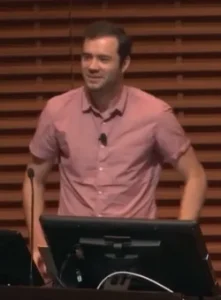Topics Discussed in #333 – Lex Fridman & Andrej Karpathy: Neural networks, Biology, Aliens, Universe, Transformers, Language models, Bots, Google’s LaMDA, Software 2.0, Human annotation, Camera vision, Tesla’s Data Engine, Tesla Vision, Elon Musk, Autonomous driving, Leaving Tesla, Tesla’s Optimus, ImageNet, Data, Day in the life, Best IDE, arXiv, Advice for beginners, Artificial general intelligence, Movies, Future of human civilization, Book recommendations, Advice for young people, Future of machine learning, Meaning of life.

Andrej Karpathy
Andrej Karpathy is a Slovakian-Canadian computer scientist who served as the director of artificial intelligence and Autopilot Vision at Tesla. He specializes in deep learning and computer vision. Andrej Karpathy was born in Bratislava, Czechoslovakia (now Slovakia) and moved with his family to Toronto when he was 15. He completed his Computer Science and Physics bachelor's degree at University of Toronto in 2009 and completed his master's degree at University of British Columbia in 2011, where he worked on physically-simulated figures. Karpathy graduated with a PhD from Stanford University in 2015 under the supervision of Fei-Fei Li, focusing on the intersection of natural language processing and computer vision, and deep learning models suited for this task. He authored and was the primary instructor of the first deep learning course at Stanford, CS 231n: Convolutional Neural Networks for Visual Recognition.
Books Mentioned in this Podcast with Lex Fridman & Andrej Karpathy:
Book Title: The Vital Question
Author: Nick Lane
Author: Nick Lane
Book Title: The Hitchhiker’s Guide to the Galaxy
Author: Douglas Adams
Author: Carl Sagan
Author: Richard Dawkins
Author: Joshua Z. Rappoport
Book Title: The Science of Deep Learning
Author: Iddo Drori
The Revolution of AI in Self-Driving Cars: Insights from Andrej Karpathy and Elon Musk
In a recent conversation between Lex Fridman and Andrej Karpathy, Tesla’s Director of AI, the future of self-driving cars and the role of artificial intelligence (AI) came into sharp focus. Their discussion covered a wide array of topics, from the challenges of AI development to the potential consequences of AI achieving a form of general intelligence. In this article, we delve into the insights shared during their conversation.
AI's Crucial Role in Self-Driving Technology
The development of autonomous vehicles is rapidly evolving, with companies like Tesla at the forefront. Elon Musk emphasized the pivotal role of AI in achieving full self-driving capabilities. He highlighted how neural networks, particularly convolutional neural networks (CNNs) and recurrent neural networks (RNNs), have proven instrumental in enhancing Tesla’s Autopilot system.
The Challenge of Data Annotation
One of the critical aspects discussed was the process of data annotation for training AI models. Andrej Karpathy shed light on the challenges of collecting and annotating vast datasets required for training self-driving systems. This process involves creating datasets that are not only large but also diverse and accurate.
Transition to Software 2.0
Elon Musk coined the term “Software 2.0” to describe the transition from traditional software development to neural networks and machine learning. This transition involves replacing manually written code with neural networks that are trained on data. This paradigm shift is revolutionizing the development of self-driving technology.
The Power of Pixels as Constraints
Pixels from cameras serve as valuable constraints on the state of the world. Cameras are relatively low-cost sensors that provide high-resolution data, enabling AI systems to perceive their environment. Pixels help in creating a detailed understanding of the surroundings, including identifying objects, road conditions, and traffic signals.
Challenges in Predictive Capabilities
While AI has made significant strides in object detection and recognition, predicting the behavior of other road users remains a challenge. Autonomous vehicles must anticipate the actions of pedestrians, cyclists, and other drivers. This aspect of the technology requires continuous improvement to ensure safe and efficient self-driving.
The Road Ahead: Beyond Self-Driving
The conversation also touched upon the potential consequences of AI’s evolution. Elon Musk and Andrej Karpathy discussed the possibility of AI achieving something akin to general intelligence or AGI. Musk’s view on the risks and ethical considerations surrounding AGI underscored the need for responsible AI development.
Conclusion
In the dialogue between Lex Fridman and Andrej Karpathy, the profound impact of AI on self-driving cars and the transportation industry became evident. AI-driven technology is rapidly advancing, reshaping how we perceive and interact with vehicles. The journey toward full autonomy continues to be a challenging but promising endeavor, and the insights shared in their conversation provide a glimpse into the future of transportation.








